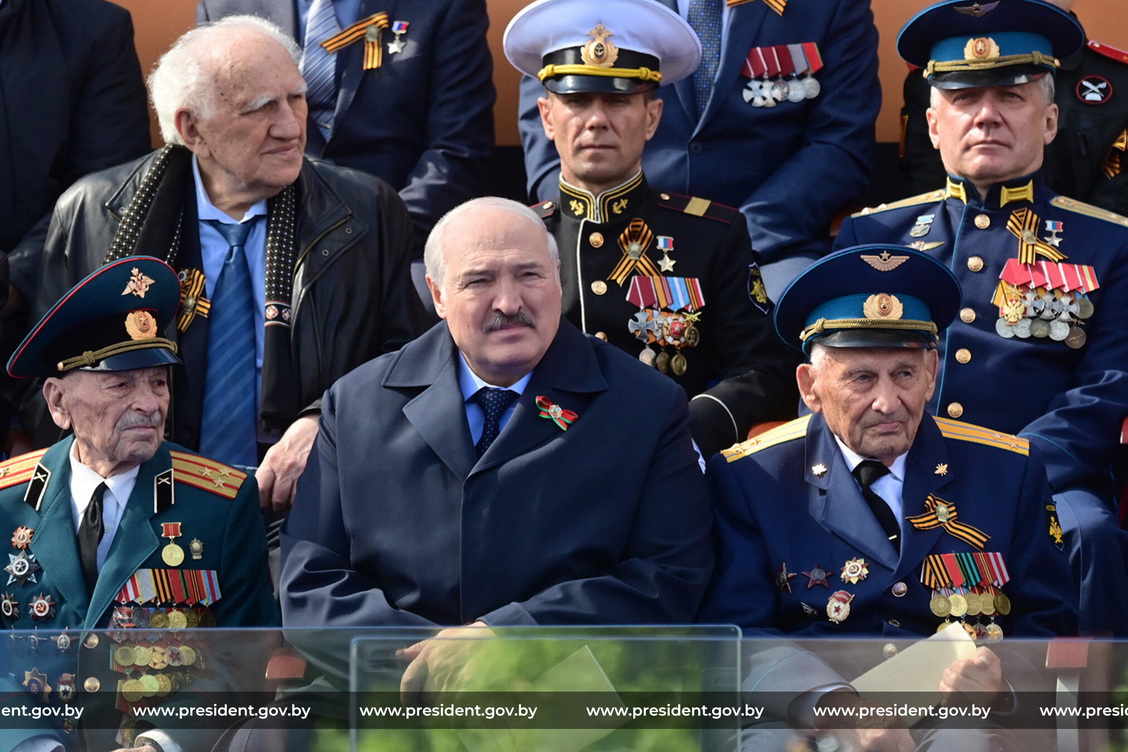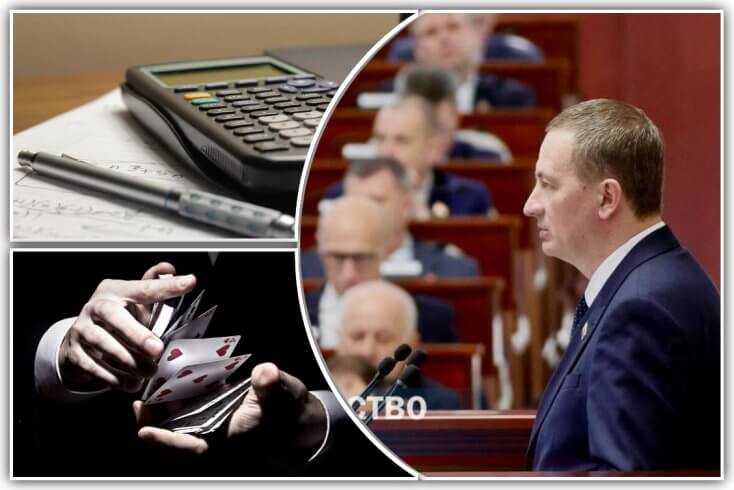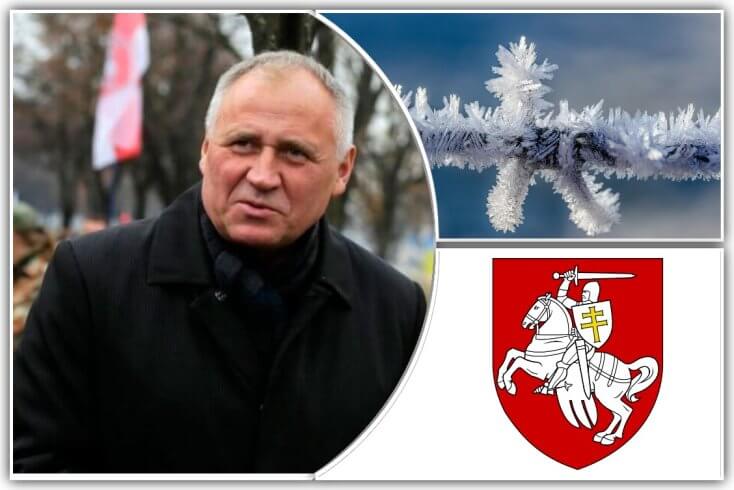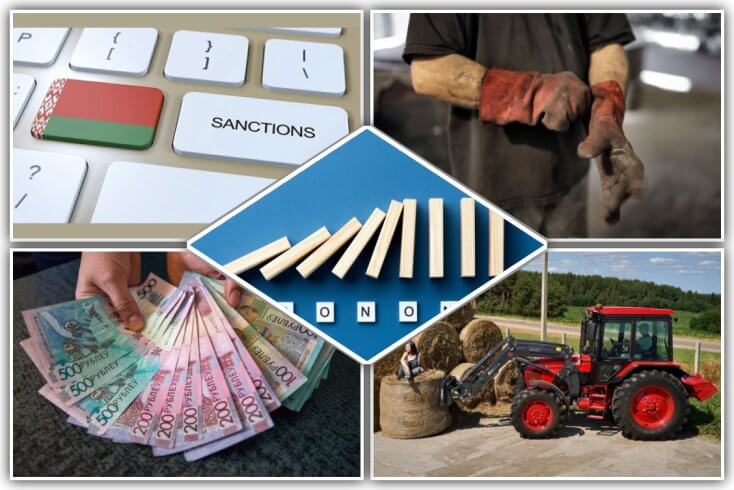On December 31, Alaksandar Łukašenka told generals to “step up vigilance so that the citizens of Belarus can celebrate New Year’s Day in peace,” as if NATO was plotting to prevent Belarusians from drinking champagne and eating potato pancakes around the Christmas tree.

In his New Year greetings, the Belarusian ruler said that “last year they tried to bring us to our knees, to strangle us economically” without mentioning international sanctions. He said he was especially grateful for peace to the law enforcers.
The top brass perpetuates the lie that Belarus is a besieged fortress, blaming domestic policy failures on its enemies.
Elections without frills
The local and parliamentary elections on February 25 will be no-frills: polling booths without curtains, vigilant police officers, ballots with only pro-government candidates and no opposition.
Law enforcers say they are ready to suppress any enemy plots on the voting day, although opposition leader Śviatłana Cichanoŭskaja urged people to ignore the no-choice elections, and NATO hordes are unlikely to spoil the party.
It will be the first elections since 2020. Frightened by mass protests against vote rigging, the Belarusian leader postponed parliamentary and local polls.
After the election ritual is over and predetermined results are announced, the All-Belarusian People’s Assembly (APA), with new status and enormous powers, will convene for its first conference in late April. The new branch of power seems to be a burden for the ruler, but he must have already decided everything for himself.
Under the new constitution, Łukašenka can be both president of the country and APA chairman. This is exactly the trick he will pull.
Succession rumors
In recent weeks, some Telegram and YouTube channels have fanned rumors that Moscow is about to replace Łukašenka with former Prime Minister Siarhiej Rumas, a non-toxic personality with mildly liberal views.
The rumors also mentioned another possible successor, Deputy Interior Minister Mikalaj Karpiankoŭ, commander of the Internal Troops. He was personally involved in the violent crackdown on protesters in 2020 and now commands a powerful internal force that includes former Wagner mercenaries. Some observers say that he has political ambitions and is just waiting for a chance.
But even if the observers are right about his ambitions, his time has not come yet.
The talk about the Kremlin’s plans to depose Lukashenko is most likely rooted in 2020, when Moscow was said to be trying to force the weakened Belarusian leader to surrender power in order to ease tensions in the country.
However, the Belarusian strongman managed to brutally suppress the protests and establish a reign of terror just in time for Moscow to launch a full-scale war against Ukraine.
The Kremlin needed an ally, and Lukashenka did his best to please the warmongering empire. Now Russian President Vladimir Putin has his hands full in Ukraine and cannot be bothered with replacing the stubborn Belarusian ruler.
Opposition leader Pavieł Łatuška speculated last year that the Kremlin was plotting to unseat Łukašenka. In particular, during the 2024 local and parliamentary elections, “it seeks to completely fill the parliament and local councils with pro-Russian forces represented by candidates from crony parties, first of all Biełaja Ruś,” with a view to removing the incumbent through impeachment in the APA.
His theory does not hold water. Although some foreign politicians perceive the Belarusian ruler as a puppet, he keeps a firm grip on power. It is true that many state officials and law enforcers are pro-Russian, but as long as the incumbent is strong, they will be afraid to rise against him. They know too well how ruthless he is towards traitors.
Health and paranoia
The rumors about Łukašenka’s imminent retirement were fueled by amendments that provide guarantees of immunity and privileges for the outgoing head of state.
Last year there were many rumors about the ruler’s poor health.
Łukašenka was obviously not feeling well at the May 9 Victory Day parade in Moscow, with his palm bandaged, he was driven to the Tomb of the Unknown Soldier in an electric car. Afterward he did not appear in public for a long time.
More than once he was seen limping and struggling to get off the plane. In St. Petersburg, during the CIS summit in December, he refused Putin’s invitation to a tour. His voice was hoarse and husky during recent appearances, especially as he read out his New Year’s greetings.
However, the amendments have nothing to do with his health. The bill was introduced to bring the law in line with the new constitution. The privileges were included just in case.
We do not know much about his condition, but he does not look bad, and the doctors are doing their best. Last year he said, “I’m not going to die, you will suffer with me for a very long time.”
The incumbent has ruled the country with an iron fist for almost thirty years. Even if he dies, the window of opportunity for democratic change will not open automatically.
His psychological type holds on to power until the bitter end, even if his fingers turn blue, no matter what he says to deny it.
If he ever gives up power, he will pass it on to one of his sons, like Heydar Aliev did in Azerbaijan. He probably favors his youngest son Mikałaj, but if things get hot, the eldest son, Viktar, may also take the helm.
Anyway, a smooth succession is out of the question. Even Kazakh President Nursultan Nazarbayev, as experienced as he is, failed to prevent a mess. Łukašenka, a paranoid personality, is well aware that the guarantees provided by the law can crumble to dust after the reins of power change hands.
Next year Łukašenka will be busy preparing for his presidential campaign of 2025.
Therefore, he is unlikely to ease reprisals or release political prisoners. He can make some concessions on an individual basis, for instance, release Polish minority activist Andrzej Poczobut to improve relations with Poland. But even that is hardly possible.
In his relations with the West, Łukašenka has made too much of a mess to hope for a dialogue or a reset. His dependence on Russia has increased drastically, and Moscow would not let him play such games.
Minsk trumpeting victory over opposition, but officials are afraid
I am outlining the basic scenario for 2024, but events can take a surprise twist. Much depends on the war in Ukraine. What if the West provides a miracle weapon to General Valerii Zaluzhnyi?
Of course, if Russia suffered a major defeat, the Belarusian regime could quickly collapse. For the time being, however, Ukraine’s position is deteriorating.
But Putin and Łukašenka are celebrating too soon. Engaged in an opportunistic confrontation with a more developed democratic world, the two regimes are doomed in the long run, but the triumph of obscurantism in Russia and Belarus may last for quite some time.
“I don’t know what the new year will bring. And I’m not going to tell you that everything will be fine,” Cichanoŭskaja, the opposition leader, said in her New Year’s address.
Minsk pulled the plug on YouTube to prevent Belarusians from listening to her speech. Evidence suggests that she defeated Łukašenka in 2020, so the regime has a valid reason to fear.
Government stalwarts are still afraid of opponents, no matter how much officials brag about universal support and the crushing defeat of their enemies.



